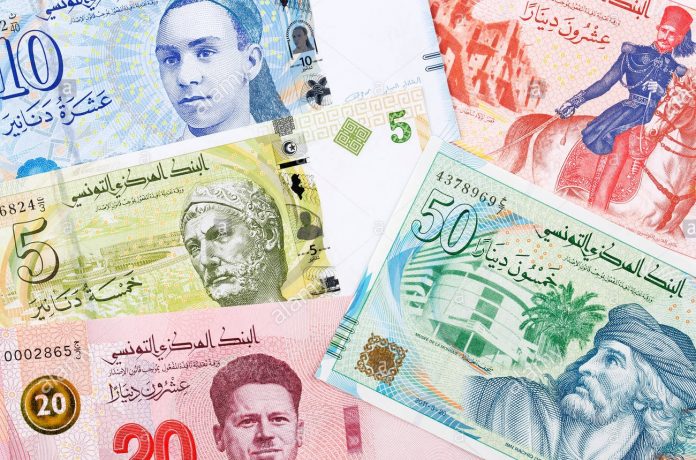MAC SA analysts believe that Tunisian banks will remain under pressure in the coming months. In 2021, they will be exposed to the risk of an economic slowdown, while they will have to make a delicate accounting change.
2020 is “the year of all challenges” for Tunisian banks, considers brokerage firm MAC SA. In the pandemic context, the countries that will see their economies slow down are those with a “fragile” national economy, economists agree. “This is the case of Tunisia, which in recent years has failed to build a strong and resilient economy, and which will have several difficulties recovering from this universal health crisis,” continues the brokerage firm.
Indeed, the Tunisian economy must expect a drop in supply and demand, both internally and externally. This will result in a surge in bank defaults and a deterioration of macroeconomic aggregates, which are difficult to quantify for the moment.
In this context, the Tunisian banks, and through the exceptional measures taken by the BCT (Central Bank of Tunisia) are showing solidarity in order to support the efforts made to deal with the pandemic and limit its economic and social repercussions.
“Yet the financial sector will be one of the hardest hit by this economic downturn, both in terms of balance sheets and results.” Banking institutions, like other economic players, must anticipate the possible impacts of this crisis and put in place mechanisms to mitigate them.
These economic impacts will have direct effects on depreciation and rating models, especially since Tunisian banks face a double challenge: the effects of the Covid-19 crisis and the adoption of IFRS in 2021.
Directly impacted by the effects of this pandemic, in the same way as the other components of the economy, the national banks will suffer the double effect of the strong economic slowdown on the one hand and the impacts of the measures to postpone the due dates of somewhere else.
Expected decline in net banking income!
The crisis will directly affect bank accounts through a deterioration in the quality of asset portfolios (increase in bad debts) and a mechanical increase in the cost of risk (provisions). In addition, the effects will be perceptible in terms of income and the liquidity ratio.
In terms of net banking income (NBI), a drop is expected due to the decrease in interest income received following the drop in the key rate by 100 basis points. However, this decrease should help control the resource costs associated with refinancing with the Central Bank.
In addition, banks will also suffer from the drop in interest received from deferral of loan maturities. Even though the latter have recognized accrued and unmatured interest and bank commissions in banking income, pending further guidance from the BCT.
Finally, banks will suffer from the reduction in bank commissions linked to electronic payment transactions as a direct result of the impact of measures to support the economy (ATM, card, TPE, etc.).
In the first half of the year, the operating expenses of the banks saw a clear increase over the half year, mainly due to donations made to the Covid-19 fund. On average, while the aggregate NBI of listed banks fell by 3%, the gross operating income (gross operating income) fell by more than 12%.
With regard to liquidity ratios, the decline in deposits from economic operators affected by the crisis (tourism, transport, mechanical and electrical industries, textiles, clothing, etc.) and the postponement of payment of due dates creates a strong strain on the cash level of banks.
This situation could affect their distribution of credits for the coming months. However, the measures announced by the BCT, if fully implemented, will be able to mitigate the negative effects of the crisis on banks.
This being the case, MAC SA analysts expect “a decrease in bank profitability, due to the decline in income from net interest margins (the latter represent 55% of GNP) but also to the increase in provisions for loan losses”.
Commitments to the most affected sectors!
According to the rating agency S&P, the cost of risk will increase from 1.2% 2019 to 3.5% in 2022, the bad debt ratio will go from 14% in 2019 to 19% -20% in horizon 2021-2022, which will lead to additional provision needs resulting in losses for some banks. This will require more capital requirements. That’s why the banks didn’t pay a dividend.
The hotel and restaurant sectors (6.5% of loans to professionals at the end of 2019), commerce (22.5%), transport and communications (6.3%) and real estate (11 %) will be the most affected by the coronavirus.
According to 2019 figures, these sectors already have the highest litigation debt rates. The crisis will also affect export industries due to the expected recession in Europe (-8.7%), Tunisia’s main economic partner.
“The Tunisian banks most involved in these heavily affected economic sectors should suffer the effects of the crisis more than those which are more exposed to the individual segment,” commented experts from MAC SA.
For its part, the government has increased the withholding tax from 20% to 35% on term investments. This decision will impact the resources of banks and in particular their stable resources. Thus, this measure intended to stimulate productive investment, would it be unfavorable to the banks since it would deepen the liquidity crisis and would push the banks to seek other stable resources (bonds, subordinated loans, external loans, repo , etc.).
Finally, another challenge for Tunisian banks is the adoption of IFRS in 2021. This fundamental accounting change is likely to affect banks more particularly due to the nature of their management and transformation activities. risks.
This is not a simple accounting adjustment but involves real challenges, both financially and organizationally and the information systems. The depreciation component is the one that will undoubtedly have the most impact.
Towards a “soft method”?
This transition to international standards will significantly affect the profitability of banks as well as their capital requirements, not to mention the impacts on information systems, reporting, risk governance, etc.
In Morocco, the transition to IFRS 9 in 2018 led to a 32% increase in provisions and a 9% decrease in equity for listed banks. In order not to put the banks under too much pressure, the BCT could opt for the soft method like its colleague Bank Al-Maghrib and also the European regulators.
For banks that are subsidiaries of foreign banks (UIB, UBCI, Attijaribank, etc.), the exercise of the transition to IFRS standards is less difficult than for other banks since they are already carrying out, for the purposes of consolidation with their mothers, reporting of financial statements under IFRS.
In the opinion of some bankers, this accounting change should not be without consequences for the credit distribution business, as banks could be more selective and more careful, especially for the lowest rated files.

